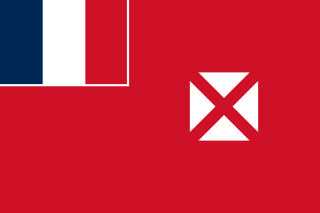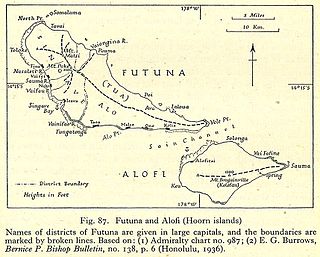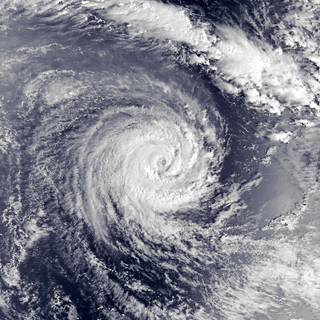
The Futuna Plate is a very small tectonic plate located near the south Pacific island of Futuna. It is sandwiched between the Pacific Plate to the north and the Australian Plate to the south with the Niuafo'ou Plate to the east.

The Futuna Plate is a very small tectonic plate located near the south Pacific island of Futuna. It is sandwiched between the Pacific Plate to the north and the Australian Plate to the south with the Niuafo'ou Plate to the east.

Wallis and Futuna, officially the Territory of the Wallis and Futuna Islands, is a French island collectivity in the South Pacific, situated between Tuvalu to the northwest, Fiji to the southwest, Tonga to the southeast, Samoa to the east, and Tokelau to the northeast.

Willem Cornelisz Schouten was a Dutch navigator for the Dutch East India Company. He was the first to sail the Cape Horn route to the Pacific Ocean.

Futuna is the largest island in Hoorn Islands or Îles Horne, located in the Pacific Ocean, part of the French overseas collectivity of Wallis and Futuna. The island occupies an area of 80 km2 (30 sq mi) and as of 2018 it has a population of 10,912.

Mata Utu is the capital city of Wallis and Futuna, an overseas collectivity of France. It is located on the island of Uvéa (ʻUvea), in the district of Hahake, of which it is also the capital. It is one of two ports in Wallis and Futuna, the other being at Leava on Futuna. Hihifo Airport, the main airport serving the island and city, is 5.6 kilometres (3.5 mi) to the northwest. Its population was 1,029 in 2018, up from 815 in 1998.
Futuna is an island in the Tafea province of Vanuatu. It is the easternmost island in the country.

Sigavé is one of the three official chiefdoms of the French territory of Wallis and Futuna in Oceania in the South Pacific Ocean.

The Wallis and Futuna national football team is the national football team of Wallis and Futuna. Wallis and Futuna is not a member of FIFA and, therefore, is not eligible to enter either the FIFA World Cup or the OFC Nations Cup, and due to the low investment in sport on the part of the country, it has been many years since it played an international match.

Alo is one of three official chiefdoms of the French territory of Wallis and Futuna, in Oceania, in the South Pacific Ocean.

The following outline is provided as an overview of and topical guide to Wallis and Futuna:

The New Hebrides Plate, sometimes called the Neo-Hebridean Plate, is a minor tectonic plate located in the Pacific Ocean. While most of it is submerged as the sea bottom of the North Fiji Basin, the island country of Vanuatu, with multiple arc volcanoes, is on the western edge of the plate. It is bounded on the south-west by the Australian Plate, which is subducting below it at the New Hebrides Trench. The Vanuatu subduction zone is seismically active, producing many earthquakes of magnitude 7 or higher. To its north is the Pacific Plate, north-east the Balmoral Reef Plate and to its east the Conway Reef Plate.

The Balmoral Reef Plate is a small tectonic plate (microplate) located in the south Pacific north of Fiji. Clockwise from the north, it borders the Pacific Plate, the Australian Plate, Conway Reef Plate, and the New Hebrides Plate. The northern and western borders are a divergent boundary while the rest of the borders are transform and convergent boundaries. The Balmoral Reef Plate's ocean crust is less than 12 million years old and is spreading between the New Hebrides and Tonga subduction. The plate forms the west central part of the seafloor of the North Fiji Basin.

The Conway Reef Plate is a small tectonic plate (microplate) located in the south Pacific west of Fiji. The western boundary is with the New Hebrides Plate while the eastern is with the Australian Plate. A short transform boundary also exists with the Balmoral Reef Plate. Much of the plate underlies the south central portion of the North Fiji Basin.

Rugby union in Wallis and Futuna is a popular sport within the French overseas territory.
The sport of football in the overseas collectivity of Wallis and Futuna is governed by the Fédération de Ligue de Football de Wallis et Futuna. The association administers the Wallis and Futuna national football team as well as the Wallis Première Division and the Futuna Première Division. No women's football is known of, though it is possible that the sport is not segregated by gender for youth football.
Alofivai is a village in Wallis and Futuna. It is located in Hahake District on the northeast coast of Wallis Island, along Route 1. The hamlets of Finetomai and Papakila also form part of the area.
The Wallis and Futuna national rugby sevens team is a minor national team that competes in the Pacific Games and in regional tournaments.

The Pacific Ocean evolved in the Mesozoic from the Panthalassic Ocean, which had formed when Rodinia rifted apart around 750 Ma. The first ocean floor which is part of the current Pacific Plate began 160 Ma to the west of the central Pacific and subsequently developed into the largest oceanic plate on Earth.

The Wallis and Futuna Rugby Committee is a committee under the umbrella of the French Rugby Federation which is the governing body for rugby union within Wallis and Futuna.

Severe Tropical Cyclone Raja was a tropical cyclone that holds the 24-hour rainfall record of 674.9 mm (26.57 in) for the French Overseas Territory of Wallis and Futuna. The system was first noted by the Fiji Meteorological Service (FMS) as a weak tropical disturbance northeast of Tokelau in mid-December 1986. The system developed further as it moved southwest over the next few days, and it was classified as Tropical Cyclone Raja on 23 December. The newly named system slowed and unexpectedly recurved southeast towards the French territory of Wallis and Futuna on 24 December. Over the next two days, Raja interacted with what would become Severe Cyclone Sally and executed a tight loop, passing within 55 km (35 mi) of Futuna. The system peaked as a Category 3 severe tropical cyclone on 28 December, with estimated 10-minute sustained winds of 90 mph (150 km/h). The storm turned southwest the next day and threatened Fiji, where it passed within 20 km (10 mi) of Vanua Levu and near several smaller islands in the Lau group during the following day. Raja gradually weakened over the next few days as it moved south of Fiji; it was last noted on 5 January 1987 after it filled up over the north Tasman Sea.